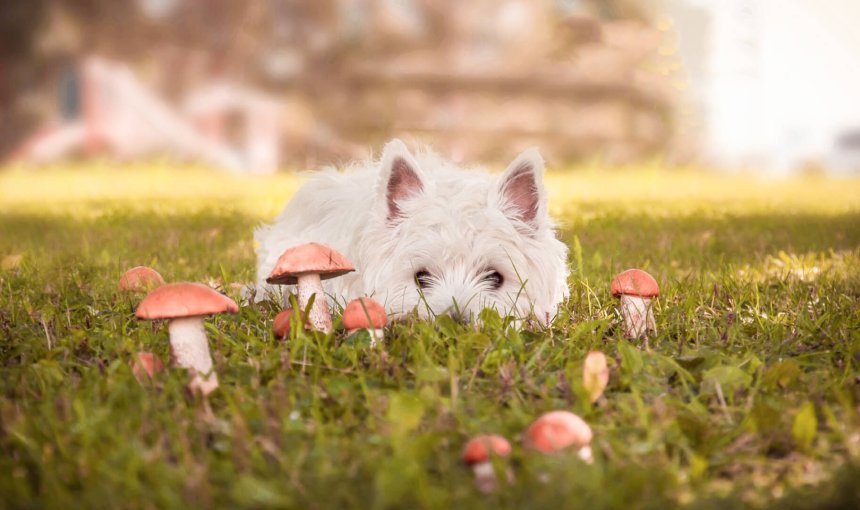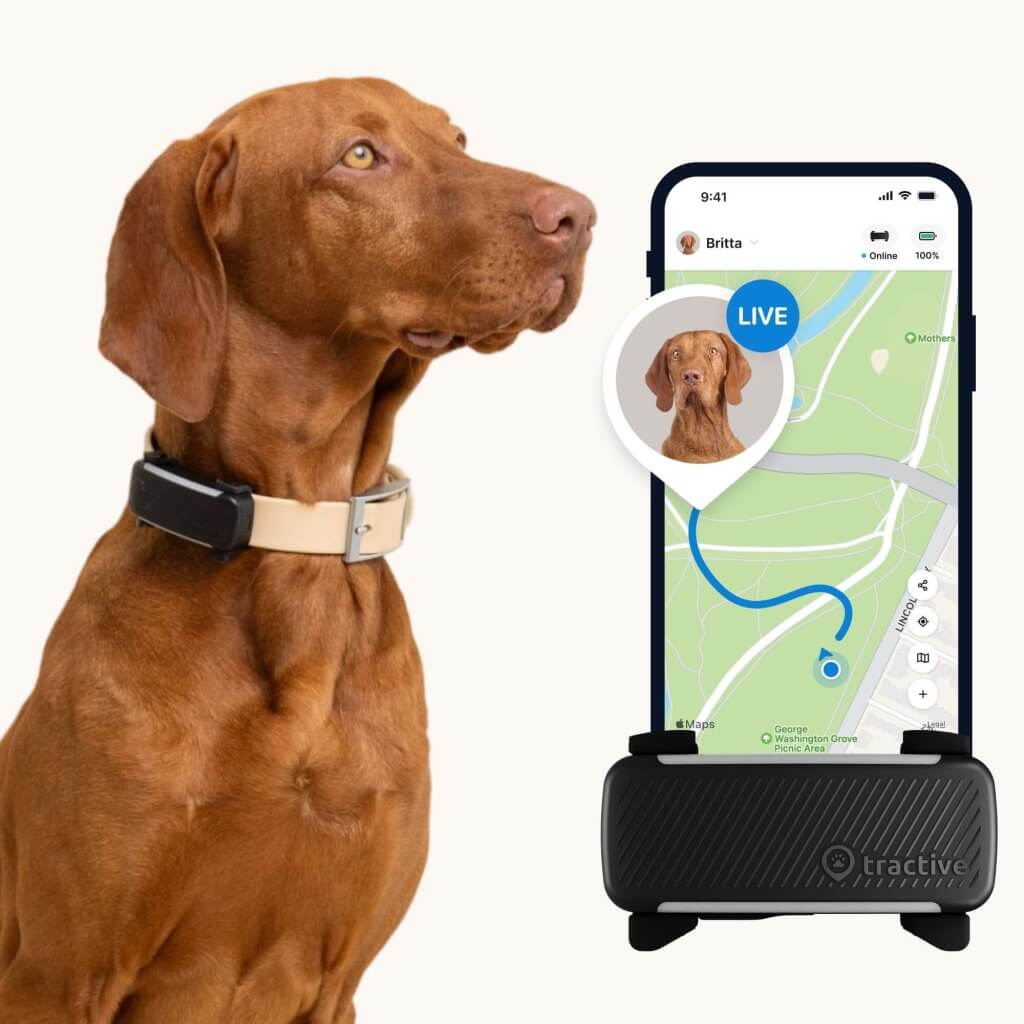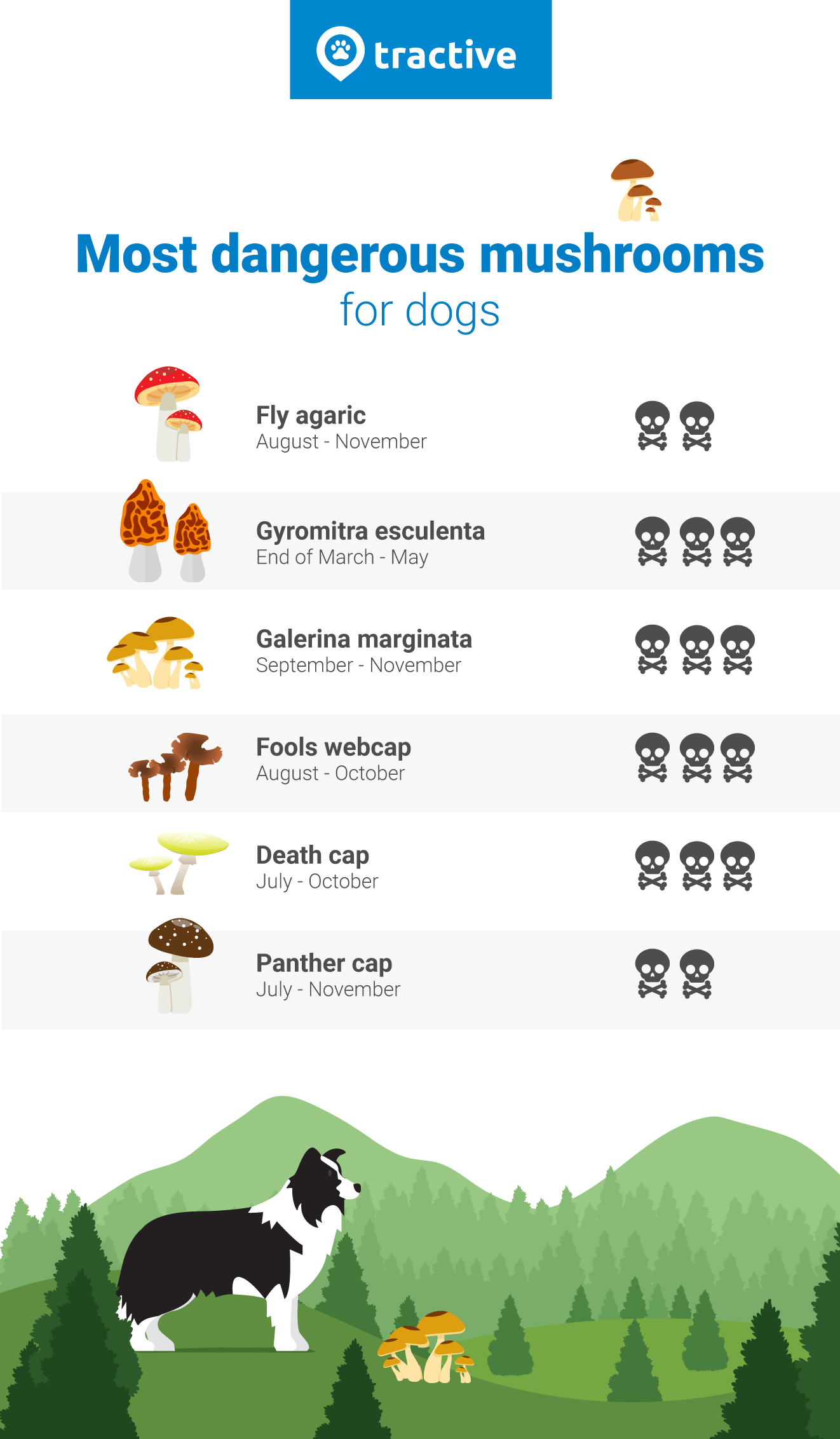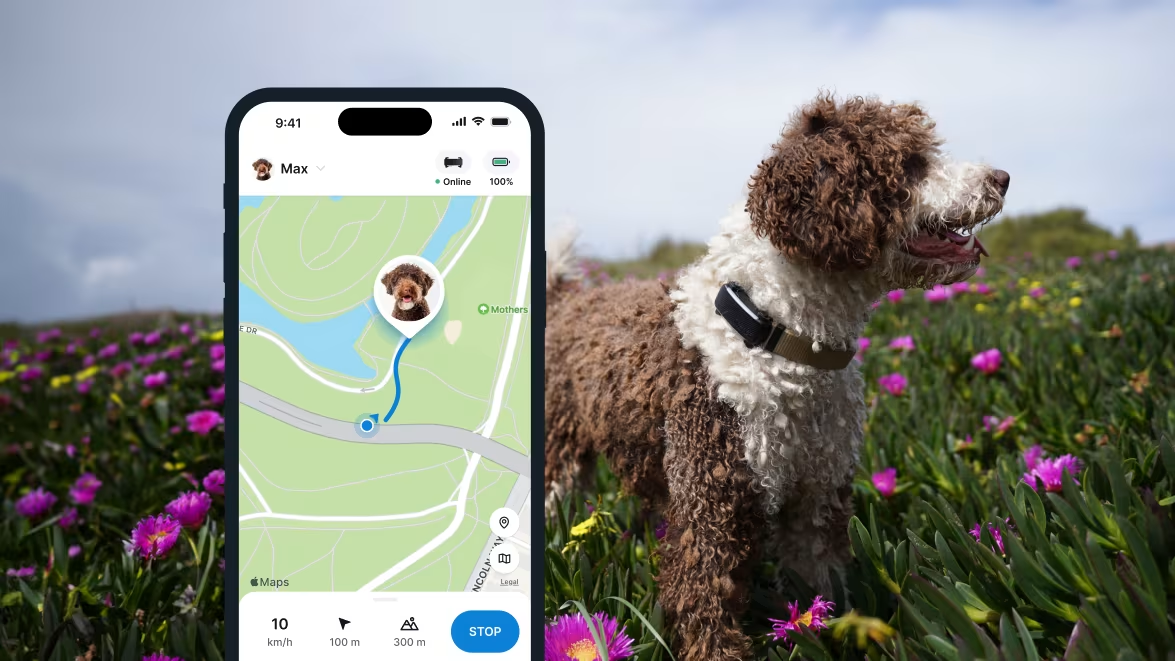 Approved by Dr. Dwight Alleyne, DVM
Approved by Dr. Dwight Alleyne, DVM The Fun(gi) Facts: Can Dogs Eat Mushrooms?
Here are the facts (and not so fun facts) about our favorite fungi - and whether our buddies can handle them.

Whether you’ve got a yard of your own or like to walk or hike through the woods with your buddy – you might find yourself wrestling out a plant or something potentially toxic out of their mouth. Which, during the spring and fall months, might just mean fallen fruits, grass…or mushrooms. (Making you look up – can dogs eat mushrooms? And in fact, are mushrooms bad for dogs?) Let’s find out.
Key Takeaways
While some wild mushrooms are harmless, others are extremely toxic to dogs and can cause severe illness or death.
The symptoms of mushroom poisoning can include vomiting, diarrhea, drooling, lethargy, tremors, seizures, liver failure, and even coma.
If your dog eats a mushroom, head to your vet or an emergency animal poison control center immediately. Try to bring a sample of the mushroom (in a paper towel or bag) for identification. Don’t wait for symptoms to appear before seeking help.
The Tractive GPS & Health Tracker offers vital signs and activity monitoring, alerting you to sudden behavioral changes – like lethargy or even an elevated heart rate – that may signal poisoning. Combined with GPS tracking, it helps you act fast if your dog eats something dangerous.

Always know your buddy is healthy & safe
Read moreCan dogs have mushrooms?
Well, yes and no. Because just like you, some mushrooms are safe for dogs while others are poisonous – and might even be deadly. It’s actually why most veterinarians advise against letting your dogs eat mushrooms in the wild, even if you think they look “safe”.1
⚠️ So to keep your dog safe, it’s best not to let them lick, taste, or eat mushrooms found in the wild.

Follow your dog anywhere
Get real-time location information, wherever they go. And find out when they try to make an escape, or just when they go somewhere they shouldn’t, with Virtual Fences.
Can dogs eat mushrooms cooked?
Grocery store-bought mushrooms are generally safe for dogs to eat – both cooked or raw. They do tend to be quite healthy and contain important micronutrients. (Including vitamins, fiber, iron, and protein.) But in general, they don’t offer a ton of health benefits for your dog. So they don’t really need mushrooms in their diet. You’re much better off cooking mushrooms for your own meals.
And if you’re partial to mushrooms yourself, you might’ve noticed how you do need to go heavy on the seasoning. (Aka, sauces, oils, salt, and other spices.) All of which, sadly, can also be harmful to dogs. Instead, you’re better off filling up your buddy’s food bowl with vegetables that are safe for dogs to eat. Including:
- Broccoli
- Carrots
- Green beans
- Peas
- Pumpkin
- Sweet potatoes
Are mushrooms bad for dogs?
Yes, some mushrooms can be poisonous to dogs just as many are to us humans, too.
And the scary part? It’s difficult to identify which wild mushrooms are poisonous in the first place. So if your buddy’s sniffing, licking, biting, or tasting even a part of them – it could just end up with the two of you in emergency vet care.
While some toxic mushrooms look obviously poisonous, others appear harmless – you could mistake them for the mushrooms you buy at the grocery store.
🍄 So look out for these toxic fungi in case your dogs eat mushrooms on your next walk outside. And of course make sure your dog doesn’t eat them!
What mushrooms are poisonous to dogs?

My dog ate a mushroom in the grass – what do I do?
First things first, act fast. Left untreated, mushroom poisoning in dogs can be deadly. (Plus there aren’t any home remedies to deal with it.) Your dog’s symptoms might vary depending on how much they ate, the kind of mushroom, and other factors like their age, health, and size. You’ll find similar symptoms also caused by different toxic pet foods.
So watch out for these signs – and head over to your vet immediately if you notice any:
- Vomiting
- Diarrhea
- Fever
- Lethargy (weakness and/or inactivity)
- Bleeding
- Yellowing of the skin
- Uncoordinated movements
- Excessive drooling
- Seizures
If you can, try and take a picture (or a sample) of the mushroom. Now your vet might be able to more easily identify whether it’s toxic or not – and take action accordingly. Besides, some social media groups may also specialize in identifying different types of mushrooms and whether they’re poisonous or not.
If your dog has already eaten the entire mushroom, try and remember its appearance so you can describe it to your vet as accurately as possible.
⚠️ Even if your dog doesn’t seem to have any of these symptoms, but ate mushrooms, it’s a good idea to visit your vet. Their symptoms might not turn up until much later – by when your dog’s health might have worsened.
How your vet might handle mushroom poisoning in dogs
When you bring your dog (and hopefully the mushroom sample) to the vet, come prepared to answer:
- When did your dog eat the mushroom? What time?
- How much did your dog eat?
- Can you describe the mushroom?
- Is your dog showing any symptoms?
Your vet will prescribe treatment based on what poison is involved plus your dog’s symptoms. In some cases, the treatment may begin by making your pet vomit up the poison by using salt water, diluted hydrogen peroxide, or Ipecac. For pets that shouldn’t or can’t vomit, your veterinarian may give your pet an antidote.
Being aware of the symptoms of dog poisoning and getting the right treatment can save your dog’s life.
💡But another, smarter way to ensure you know what your dog is up to at all times? (Especially outdoors?) Tracking their location in real-time.
Why a smart dog tracker = stress-free walks together
Let’s face it – dogs are curious explorers, especially when out sniffing through leaves or woods where wild mushrooms might lurk. But with a Tractive GPS Dog Tracker, you don’t have to let worry tag along on your walks.

Strapped to your dog’s collar, you can now:
- Know where your dog is – always
Real-time GPS tracking ensures you can see your dog’s exact location at any moment, whether they’re trotting by your side or investigating the bushes a few steps ahead. - Never lose track with virtual fences
Set up safe zones (like your backyard or walking trail) and get instant alerts if your dog leaves – or returns to – those boundaries. It’s like a digital leash, without limits. If your pup bolts after a squirrel or veers into an area with potential mushroom hazards, Tractive lets you respond fast before curiosity leads to danger.

- Spot early signs of trouble with Health Monitoring
Your tracker also keeps tabs on your dog’s activity levels and sleep patterns. Sudden drops or changes could be a signal they’ve eaten something they shouldn’t – like a toxic mushroom. - Keep track of your dog’s vital signs
Besides activity and sleep, your tracker also helps you pick up on the more immediate signs of poisoning – like an elevated heartbeat or excessive panting. Helping you catch red flags early and act before things escalate.
Whether your dog stays close or roams a little further, Tractive helps you walk together with confidence – knowing you’ve got the tools to protect them from what you can’t always see.
Your furry friend’s health and wellbeing means as much as to us as it does to you. So we’ve made it a priority to only share medically-relevant content on our blog. This post was checked, double-checked, and medically verified by Georgia-based vet, Dr. Dwight Alleyne.

Dr. Dwight Alleyne, DVM
Originally from Long Island, New York, Dr. Alleyne began his career at a no-kill animal shelter before becoming a licensed veterinary technician. He graduated from Cornell University Veterinary College in 2006 and completed an internship at Purdue University. Now practicing in Georgia, Dr. Alleyne specializes in soft tissue surgery and ultrasounds. He also writes pet health articles on his website, “The Animal Doctor Blog” (www.anmldrblog.com).



